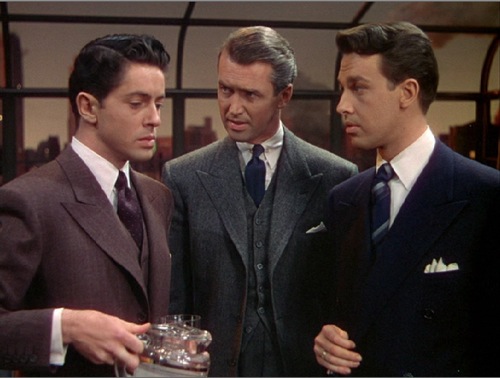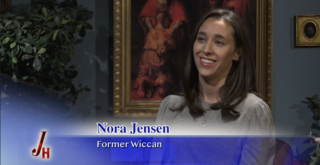
This is part of an ongoing series from Ken Hensley. Read previous installments: Part I Part II Part III
So I’m sitting in the lecture hall when my atheist psychology professor traipses into the room and launches into a lecture on the origins of morality. He begins:
Right and wrong do not exist. They are merely societal conventions, words we use to describe what we approve and disapprove. In some Inuit tribes the elderly, when determined no longer useful to society, are put on a block of ice and kicked out into the ocean to starve to death. This is their way, and who are we to say they are ‘wrong’?
I looked around the room. No raised eyebrows. No looks of consternation. Most seemed to be studiously taking notes as though what the professor had said was entirely unremarkable.
I thought to myself: How extraordinary. If God exists, then quite obviously objective moral law might exist as well. This man has essentially walked into the room and announced the non-existence of God and no one seems shocked.
“Professor,” I began, “if what you say is true – that ‘right and wrong do not exist’ and are ‘mere societal conventions’ – wouldn’t it follow that none of us can really say that what Hitler and the Nazis did was ‘wrong’? Wouldn’t it follow that the best we can do is say that we strongly disagree with their view of things?”
I remember it as though it were yesterday. The professor began to step—almost stumble—backward toward the corner of the lecture hall. His face turned slightly red. He looked as though he were deep in thought, and finally he replied: “Well, I suppose there are some things we agree on enough that they kind of really become… wrong.”
Relative from Person to Person
I’ve never met a person who didn’t believe in the existence of an objective moral law.
Oh, some of us may say we believe morality to be relative from person to person, but we don’t really. And we give evidence of this continually.
A lady steps in front of me in the line at the grocery store checkout counter. I say, “Excuse me, but I was already in line.” Now, she may respond in a number of ways: “Oh, I’m sorry, I didn’t see you.” “Forgive me but my father is ill and I’m in a big hurry this morning.” “Please. Your shopping cart is full and I only have a couple of items,” and so forth.
The one thing she will never say is: “You were already in line? So what? Morality is relative and my moral standards are different than yours. Better luck next time.”
Even when it comes to something as minor as taking someone’s place in line at the grocery store checkout counter, we know that what she has done is wrong. We know this as surely as we know that a world external from ourselves exists.
Relative from Culture to Culture, Society to Society
Now, we can attempt to escape the complete individualism illustrated above by asserting instead that moral standards are determined by entire cultures and societies, that Right and Wrong are “societal conventions” and therefore, while still relative, at least not as relative as saying each person decides for him- or herself.
But it turns out no one really believes that, either. At least I’ve never run into one who did.
Because if they did, they wouldn’t go around talking about one culture or society being morally superior to another. And yet they do. Why would one argue, for instance, that modern liberal morality is “better than” ISIS morality, or that the moral values of the Peace Corp are “higher than” those of the Mafia – if one really believed that Right and Wrong are cultural conventions and that morality is “relative” from society to society?
The fact is, the moment you or I say that the morality taught in the Jewish synagogue down the street is “superior” to the morality taught by Boko Haram, we’re appealing to a standard of morality we see as existing independent of those societies, and above them, and by which we believe we can measure them both.
We’re assuming the existence of a kind of absolute moral measuring stick, what C.S. Lewis referred to as the “Law of Morality.” But if there is no such absolute moral measuring stick, isn’t it nonsense for us to argue that one society’s morality is superior to another? After all, perhaps the members of Boko Haram simply live by a different set of societal and cultural conventions then we do. And as the good professor said, “who are we to say they are ‘wrong’?”
Again, no. We all seem to believe in the existence of an objective Moral Law, some kind of real standard that exists in the real world, something higher than our own opinions and preferences.
Relativists and Absolutists at the Same Time
Ironically, because atheists have been created in the image and likeness of God and have the Moral Law etched into their very beings, even as they know to their bones that human beings possess inherent, high and equal value (Part II of this series) so also they know to their bones that Right and Wrong are real.
Because of this, even though they may say that morality is relative, they cannot live as though it were true. In order for their lives to not descend into complete and utter moral chaos, they actually live (and must live) as though an objective Moral Law exists.
And so while the atheist ethics professor may teach moral relativism and mock those ignorant and arrogant enough to believe in “moral absolutes,” just try cheating on his test on moral relativism. You’ll be stunned at how quickly –presto! – he becomes a moral absolutist!
Try insisting at gunpoint that he give you an “A” on the test. See how quickly moral relativism goes out the window.
The reality is that if he were to attempt to live in a manner consistent with his relativism, his life would implode.
I think again of the atheist professor I mentioned earlier. Here was a man so confident in his relativism that he was willing to announce as fact, to a lecture hall filled with college students — and with an air of “every smart person knows this!” — that Right and Wrong do not exist. And no doubt he imagined himself a moral relativist – because it followed from his atheism. But when confronted with the unpleasant logical implication of his worldview—he collapsed.
In the end, he simply could not maintain the fiction that morality is nothing more than cultural convention. He could not escape believing in Right and Wrong.
Hitchcock’s “Rope”
In Alfred Hitchcock’s wonderful film Rope, the reality I’m describing here – how atheists wind up being moral relativists and absolutists at the same time – is powerfully illustrated.
The film is about two students, inspired by their prep-school headmaster’s approving discussion of the Nietzschean idea that in a Godless universe in which moral absolutes do not exist, those who are superior can do what they like with those they deem inferior.
As an intellectual exercise, in order to demonstrate their freedom to act in a universe without God and impress their teacher with how thoroughly they have imbibed his ideas, they murder a fellow classmate they consider inferior to themselves. They hide the body in a large wooden chest, invite guests over for a dinner party, and use the chest as their buffet table. The guests include the murdered boy’s father, his fiancé, aunt, close friend – and the headmaster who has inspired their exercise in true moral relativism.
Certain their esteemed headmaster (played by Jimmy Stewart) will be pleased with the seriousness with which they have taken his teaching, throughout the evening they drop little hints as to what they’ve done. As the film concludes, their beloved mentor lifts the lid on the chest and finds the body inside. Horrified by what his students have done, and mortified by their surprised insistence that they have only done what his teaching inspired them to do, he goes white and cries out (in essence), “But those were just ideas!”
Well, this is what moral relativism seems to be – just an idea that, when it comes down to it, has very few takers.
Up Next: How I Evangelize Those Who Doubt or Deny the Existence of God, Part V










